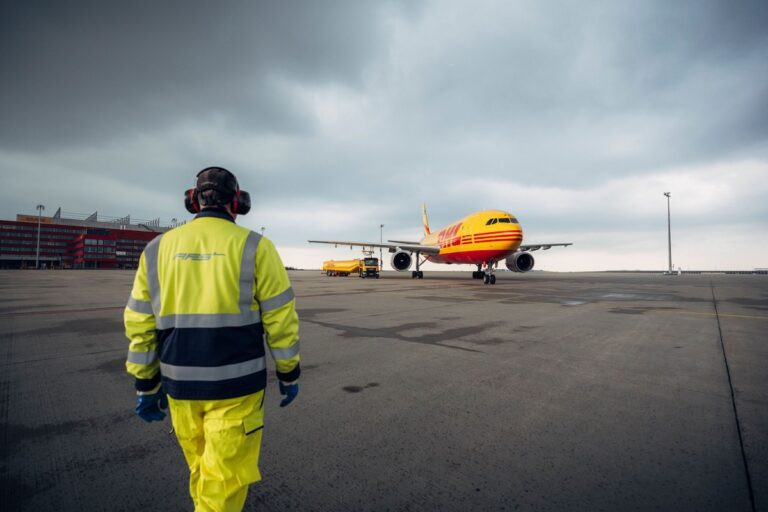In a bid to make logistics more environmentally friendly, DHL is promoting its ‘Book and Claim’ strategy, providing a pathway for individuals and businesses alike to contribute to green practices within the industry.
Whether shipping a single parcel or a larger pallet, any participant can engage in the market for sustainable fuels, leveraging emissions reductions toward their sustainability objectives.
While their goods may not physically utilise sustainable fuels during transportation, their involvement in the market signals demand and can effectively incentivise suppliers worldwide to ramp up production.
This is crucial for the industry as it strives to accelerate the availability of sustainable fuels to meet the growing demands of the transportation sector and align with global climate targets.
By 2026, advocates of “book and claim” seek to establish it as a credible industry standard, driving accelerated decarbonisation efforts.
DHL sees this approach as holding the key to achieving environmental targets and supporting broader greenhouse gas reduction goals, marking a significant step forward in the fight against climate change within the logistics industry.
“The concept of “book and claim” is straightforward: “book” refers to accurately recording decarbonisation activities and linking them with accounting systems to ensure transparent documentation of emissions reductions,” Yin Zou, Executive Vice President Corporate Development at DHL Group, explained.
“Meanwhile, “claim” involves using this documentation to credit users who invest in and utilise these reductions. This process not only ensures transparency but also guards against greenwashing.
“The urgency for such a strategy is evident as the logistics industry is a significant contributor to carbon emissions.
“However, a key hurdle in implementing “Book and Claim” is the lack of a standardised market-based accounting system for auditing these activities. Customers seek assurance that their investments in green products are credible and verifiable.
“Currently, the absence of a clear framework within the Greenhouse Gas Protocol exacerbates this challenge, resulting in a “chicken and egg” scenario.
“To address this, industry players are collaborating with NGOs, customers, and auditors to pilot and develop a standardised approach for the sector.”
Making green initiatives more affordable
In the aviation industry, sustainable aviation fuel (SAF), made from renewable materials, such as used cooking oil, is notably pricey due to limited feedstock availability.
However, ongoing technological advancements and efforts from various companies aim to address these challenges, seeking to make SAF production more economically viable. It’s anticipated that costs may gradually decrease after 2027 as these technologies mature.
Amidst this landscape, there’s a notable shift in industrial behaviour, with some advocating for separate transfer of environmental benefits from SAF to Scope 1 users like airlines and Scope 3 users like consumer goods companies. While well-intentioned, this approach carries risks, as unused Scope 1 emissions could render Scope 3 credits essentially worthless.
“To mitigate this risk and ensure meaningful emissions reductions, we advocate for a value-chain approach,” Yin explained.
“In this model, airlines like ours purchase and use SAF directly, accounting for Scope 1 emissions. Customers then benefit from Scope 3 reductions when utilising our services, creating a tangible value proposition.
“This approach ensures that emissions reductions are genuine and meaningful rather than speculative.
“Recent developments, such as a deal from a major US technology company focusing solely on Scope 3 emissions, highlight the growing interest in emissions reduction initiatives.
“However, it’s crucial to maintain the integrity of the value chain to prevent potential misuse of emission credits. Standardisation in this regard is paramount, ensuring transparency and accountability in the industry.”
Forward momentum
There are several driving forces behind the motivation for decarbonisation efforts. Firstly, from a personal perspective, many small and medium enterprises (SMEs) are increasingly aware of changing trends and an increased willingness to pay extra and take action to contribute to saving the Earth.
Secondly, regulatory measures are becoming stricter, which is a positive development. Collaborative efforts between governments and businesses mean that decarbonisation is no longer an option but a necessity. The penalties for non-compliance are increasing, making it imperative for companies to engage in decarbonisation efforts to remain compliant and responsible.
Lastly, there is a “front-runner effect” at play. They actively target customers who have signed up for initiatives like the Science-Based Targets Initiative. By working closely with these customers to decarbonise their supply chains, DHL has observed a ripple effect across sectors as leading companies set an example for others to follow. This spillover effect encourages broader industry engagement in decarbonisation efforts.
“Taking proactive steps towards decarbonisation is essential, especially considering the potential consequences of inaction. By leveraging personal motivations, responding to regulatory pressures, and capitalising on the influence of industry leaders, companies like DHL can drive meaningful change towards a more sustainable future,” Yin stated.
“In today’s evolving society, particularly with shifting demographics and the emergence of new generations, the emphasis solely on profit becomes a less convincing argument for big corporations. There’s a growing recognition of the responsibility that comes with corporate stature.
“Fortunately, we’ve experienced the benefits of aligning our operations with a broader purpose. Our success isn’t solely measured by financial gains but also by our positive impact on society and the environment.
“While some companies may adopt a “wait and see” approach, we believe that such behaviour is not only irresponsible but also shortsighted. As market leaders, it’s incumbent upon us to take decisive action rather than passively observe the changing landscape.
“By doing so, we not only ensure the long-term sustainability of our business but also contribute positively to the well-being of society and the planet.”





